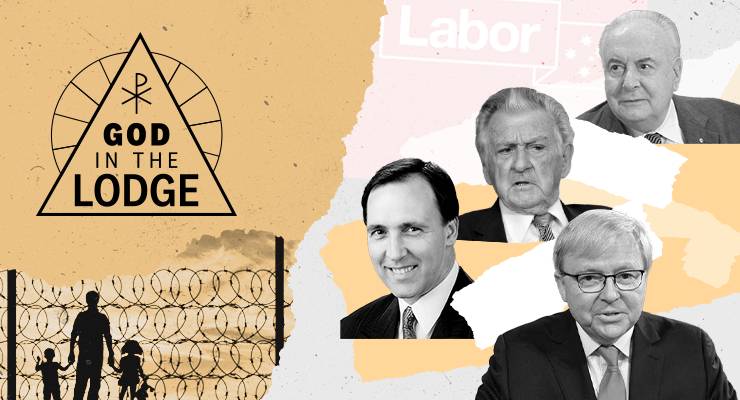
This story is part 11 in a series. For the full series go here.
The problem with Scott Morrison’s government is not that it is “too Christian” but that it is not nearly Christian enough.
Deep down, I believe Morrison knows this, hence his fatuous remark, recently repeated in the foreword to a new book about Sir Robert Menzies, that “the Bible is not a policy textbook”. Literally, of course, that is true. But it is also a cop-out, designed to deflect scrutiny. Any self-respecting Christian should always test their conduct against the Bible’s “purpose or direction”.
For a Protestant, especially an evangelical Protestant like Morrison, this simply must be front of mind. What would Jesus do? You do not glean that from opinion polls, wealthy backers, or pundits in the Murdoch media. You glean it from daily Bible reading, a judicious study of history and theology, sincere contemplation, and prayer — for your Christian conscience must not only be sincere and obeyed but suitably informed. Any Catholic must also heed the Vatican’s edicts.
These strictures apply to a politician as to any other believer. In the words of Dame Enid Lyons, the wife of one of Australia’s truly devout national leaders, Joe Lyons (1932-39), and herself a trailblazer for women in politics: “If religion matters at all, it matters in every department of life.”
A key challenge for any Christian in politics is to ascertain the general thrust of biblical teaching — and then apply it coherently and non-selectively to every issue and in every situation. This is where near-insuperable problems arise for any party-aligned politician in Australia today, of the right or the left. Why?
Integrity and truth-telling
For a start, biblical Christianity enjoins integrity and truth-telling. Modern Australian politics is a wasteland of spin, obfuscation, buck-passing, blame-shifting, promise-breaking, secrecy, narcissism, treachery, hyperbole, hypocrisy and outright deceit. There are individual exceptions, but not many. Things have not yet reached the nadir here that they did in Donald Trump’s America. But Trumpism is the logical endpoint of nihilism. Our last prime minister to come anywhere near the “straight-talking” ideal was Paul Keating.
Politicians in the major parties are also constrained by strict internal discipline. Those who vote against the party line are liable to expulsion; at best, their fate is ostracism.
Another problem for Christians of all political stripes is that church teachings across the whole gamut of “social” issues — abortion, gay marriage, euthanasia, gambling, temperance, usury, pornography, crime and punishment, religious education, domestic violence, divorce, sex outside marriage, recreational drug use, prostitution, Sabbatarianism, etc — are very hard to categorise in “right/left” terms.
Christian positions are not quite as rigid as many imagine, but may nonetheless fairly be described as conservative. Twenty-first century attitudes are, increasingly, hardline libertarian.
Few, if any, Christian parliamentarians in positions of leadership in Australia demonstrate a consistent attitude on social and moral issues. (Again, the last to do so was Keating — he was a conservative.)
What about the four perennial issues of practical politics: the distribution of wealth, war and peace, human rights, and conservation of the natural environment?
There is a good deal of room for principled argument on questions of method and detail. But it seems to me obvious — though I realise many of my fellow evangelicals do not agree — that the emphasis of the Bible is clear as crystal.
Economic policies should be charitable in intent: plutocracy or hard-heartedness is unbiblical. The use of military force should always be an absolute last resort on rock-solid grounds. (The only other valid Christian position is pacifism.) Basic human rights must be respected and if necessary enshrined in law: every human is of equal worth because all are made in the image of God. Mankind has a duty of stewardship over God’s creation.
In short, to put it over-bluntly, a Christian’s instincts on these four issues should be left-leaning.
Labor PMs mostly social conservatives
Almost all Labor prime ministers in Australia have seen things this way. In its formative decades the ALP was dominated by committed Protestants — especially Methodists and other nonconformists. Most were social conservatives zealous to ameliorate poverty and injustice.
Andrew Fisher, thrice prime minister in the period up to and including World War I, was a pious, lifelong Presbyterian. Fisher’s biographers have argued convincingly that it was his governments that embedded the “fair go” ethos into our national psyche.
Following the first Labor split over conscription in 1916-17 — tragically initiated by Billy Hughes (1915-23) — the ALP’s parliamentary ranks came to be dominated by Catholics.
Jim Scullin (1929-32) was the most personally devout prime minister in our history, though (like his presidential equivalent in the United States, Jimmy Carter) a noble failure as a politician.
John Curtin (1941-45) abandoned the Catholic Church of his upbringing, but keenly felt the void. Under the strain of World War II, he probably made a late conversion. Certainly, in the words of one biographer, Curtin “never repudiated the Christian philosophy. Indeed, it influenced his everyday life more deeply than it did the lives of many churchmen of his era”.
Ben Chifley (1945-49) was a practising Catholic. Though he had a strained relationship with the church hierarchy, our best-loved prime minister read the Bible cover to cover 11 times in his last years. In 1950 he wrote:
All those who seek to spread the gospel of Christ are, I feel, duty-bound to follow his own rule of life to help the lowly to better things, which was shown I think in the New Testament.
Even after the second Labor split of 1955 — initiated by right-wing Catholics over the issue of anti-communism — many Christians of all denominations stayed within the movement. They included future prime ministers.
True, Gough Whitlam (1972-75) and Bob Hawke (1983-91) both lost the personal faith of their youth and became agnostic. But Whitlam was a proud, self-described “fellow-traveller” with Christianity, and his knowledge of all things Christian was second to none. It was Whitlam who in 1969 finally won the tortuous battle within the ALP over state aid to religious schools.
Hawke was famously the son of a Congregationalist minister (and a doting, puritan mother). He wrote in his memoirs that his parents’ “basic Christian principles of brotherhood and compassion” drove his public life: “[They] fostered in me beliefs and precepts which were to guide my future career.”
Keating is a complicated study
What of Keating, hero of many true believers? In some ways he is a complicated study; nowadays he does not wear religion on his sleeve. But there is a decent case to be made that he was the most genuinely Christian prime minister since World War II. In 1997, at the launch of a book about the religious order founded by St Mary MacKillop, he quoted St John of the Cross (the section headed “Obedience”):
What does it profit you to give God one thing if he asks of you another? Consider what it is that God wants and then do it. You will as a result satisfy your heart better than with something toward which you yourself are inclined.
Those words, he said, “are still as valid today as ever”.
Over the 25 years since Keating lost office in March 1996, the ALP has won a majority of seats in the House of Representatives only once — October 2007. It is a pathetic record, especially given the wretched performance of Coalition governments in Canberra since September 2013.
The Coalition’s catalogue of sins is long. But surely among the worst — from a Christian perspective — are venal inaction on climate change; unapologetic cruelty towards asylum seekers; hefty cuts to foreign aid; the iniquitous and duplicitous 2014-15 budget (where to begin?); robodebt; “sports rorts”; nauseating toadying to Trump; and, during the worst of the COVID pandemic, a clear desire (fortunately thwarted by the states and territories) to prioritise “freedom” and “reopening the economy” over public health.
Add for good measure the lack of any meaningful progress on religious freedom laws, Indigenous recognition, live animal exports, the budget deficit, skyrocketing house prices, or an effective federal anti-corruption body.
Robodebt shines a light on Morrison
Robodebt is particularly instructive for the light it shines on Morrison. It was his baby, as minister for social services.
Incompetence is one thing. But what should most offend any thinking Christian is the unseemly relish with which politicians such as Morrison regularly beat up on weak individuals “to save taxpayers’ money”, while applying quite different standards to the wealthy and privileged (e.g., lavish, no-strings-attached JobKeeper payments in 2020 to corporations which did not need them), and above all to the military-industrial complex — think of the fortune squandered by Australia alone in Afghanistan (estimated $10 billion), Iraq ($5 billion) and on unbuilt French submarines (who knows?).
Federal Labor’s repeated failure to achieve electoral success has caused these scandals.
It is no coincidence, in my view, that Labor was led to victory in October 2007 by an articulate ecumenical Christian, Kevin Rudd. After entering Parliament in 1998, Rudd spent years attempting to restore trust in the ALP among lower-income Christian voters (and sensible middle-ground voters in general). He succeeded — temporarily. John Harrison called it the “Bonhoeffer effect”.
Rudd’s government was far from perfect. But for a long time it was popular, and policy-wise it did considerably more good than harm.
Since September 2013 Australia has endured eight wasted years (and counting) of Coalition misgovernance.
Rudd’s and Keating’s recent stream of public policy pronouncements — Malcolm Turnbull’s too — are a sad reminder of what might have been.
The morals of the story? The federal Coalition in its current form does not deserve to win reelection, let alone the “Christian vote”. But Labor in recent times has made insufficient effort to win that vote back. It could start by relearning its history.








Thank you for that history. There is absolutely nothing Christian in what Morrison does from his constant lying, use of public money for political gain and his persecution of the poor and meek. I don’t understand why the MSM haven’t noticed. You are right about Labor as well. Too craven to stand strongly for what is right.
As the most instinctively mendacious prime minister we’ve ever had, does any of this surprise ?
But why doesn’t the MSM call him out on this?
Oh, that’s not fair! Surely Howard was much more “instinctively mendacious”, but ok, I concede, let’s call it a tie!
Modern Australian politics is a wasteland of spin, obfuscation, buck-passing, blame-shifting, promise-breaking, secrecy, narcissism, treachery, hyperbole, hypocrisy and outright deceit.
Very sadly, this sentence is a truly accurate picture of Australian politics today
Jesus Christ gave his followers only two commandments – the second of which states quite unambiguously ” Thou Hall love your neighbour as yourself”. Locking up refugees is not loving your neighbour! Neither is unjustly saddling the needy with illegal debt.
If Morrison as a soldier disobeyed a lawful command as blatantly as this, a court martial would be a very fast happening
Thanks Rob, an interesting read. I am intrigued by your description of Ben Chifley as a practising Catholic who perused the Bible regularly. In fact Chif’s religious life became something of a political issue when he married, with Presbyterian rites, a relatively well-off Protestant. That was quite a brave act in those sectarian times and suggests that while Chif may have been devout, he can’t be described as simply a practising Catholic. On the other hand, his personal and public morality are a rebuke to his shabby successors, especially the current one.
Since the first day I saw Morrison it was unbelievable, to me, that anyone could find anything remotely Christian about him – his deeds prove the lies of his words every day